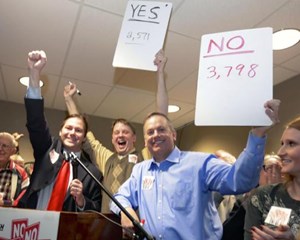In April, Podhorzer began hosting a weekly 2+1/2-hour Zoom. It was structured around a series of rapid-fire five-minute presentations on everything from which ads were working to messaging to legal strategy. The invitation-only gatherings soon attracted hundreds, creating a rare shared base of knowledge for the fractious progressive movement. "At the risk of talking trash about the left, there's not a lot of good information sharing," says Anat Shenker-Osorio, a close Podhorzer friend whose poll-tested messaging guidance shaped the group's approach. "There's a lot of not-invented-here syndrome, where people won't consider a good idea if they didn't come up with it."
今年4月,Podhorzer開始每周舉辦一次2個半小時的Zoom節目。會議由一系列五分鐘的快速演示構成,內容涉及從廣告的作用到信息傳遞到法律策略的方方面面。這些僅限受邀者參加的集會很快吸引了數百人,為難以控制的進步運動創造了一個罕見的共享知識基礎。Podhorzer的好友阿納特·申克-奧索里奧表示:“冒著說左翼壞話的風險,左翼并沒有很多好的信息共享。”申克-奧索里奧的信息指南經過民調檢驗決定了該組織的做法。“有很多非我發明綜合癥,如果一個點子不是自己想出來的,人們就不會考慮它。”
The meetings became the galactic center for a constellation of operatives across the left who shared overlapping goals but didn't usually work in concert. The group had no name, no leaders and no hierarchy, but it kept the disparate actors in sync. "Pod played a critical behind-the-scenes role in keeping different pieces of the movement infrastructure in communication and aligned," says Maurice Mitchell, national director of the Working Families Party. "You have the litigation space, the organizing space, the political people just focused on the W, and their strategies aren't always aligned. He allowed this ecosystem to work together."
這些會議成了左派特工們的銀河中心,他們有共同的目標,但目標通常不一致。這個組織沒有名字,沒有領導人,也沒有等級制度,但它讓不同的參與者保持同步。工人家庭黨全國主席莫里斯·米切爾表示:“工人家庭黨在保持運動基礎設施的溝通和協調方面發揮了關鍵的幕后作用。”“你有訴訟空間,有組織空間,政治人士只關注W,他們的策略并不總是一致的。他讓這個生態系統協同工作。”

Protecting the election would require an effort of unprecedented scale. As 2020 progressed, it stretched to Congress, Silicon Valley and the nation's statehouses. It drew energy from the summer's racial-justice protests, many of whose leaders were a key part of the liberal alliance. And eventually it reached across the aisle, into the world of Trump-skeptical Republicans appalled by his attacks on democracy.
保護選舉需要空前規模的努力。隨著2020年的進展,它延伸到了國會、硅谷和美國的州議會。它從今年夏天的種族正義抗議活動中汲取了能量,其中許多領導人都是自由聯盟的關鍵成員。最終,它跨越了兩黨,進入了對特朗普持懷疑態度的共和黨人的世界,他們對特朗普對民主的攻擊感到震驚。
The first task was overhauling America's balky election infrastructure—in the middle of a pandemic. For the thousands of local, mostly nonpartisan officials who administer elections, the most urgent need was money. They needed protective equipment like masks, gloves and hand sanitizer. They needed to pay for postcards letting people know they could vote absentee—or, in some states, to mail ballots to every voter. They needed additional staff and scanners to process ballots.
第一個任務是在一場大流行的情況下,徹底改革美國停滯不前的選舉基礎設施。對于數千名管理選舉的地方官員來說,最迫切需要的是資金,這些官員大多是非黨派人士。他們需要口罩、手套和洗手液等防護設備。他們需要花錢買明信片,讓人們知道他們可以缺席投票——或者,在一些州,郵寄選票給每個選民。他們需要額外的工作人員和掃描儀來處理選票。
譯文由可可原創,僅供學習交流使用,未經許可請勿轉載。











